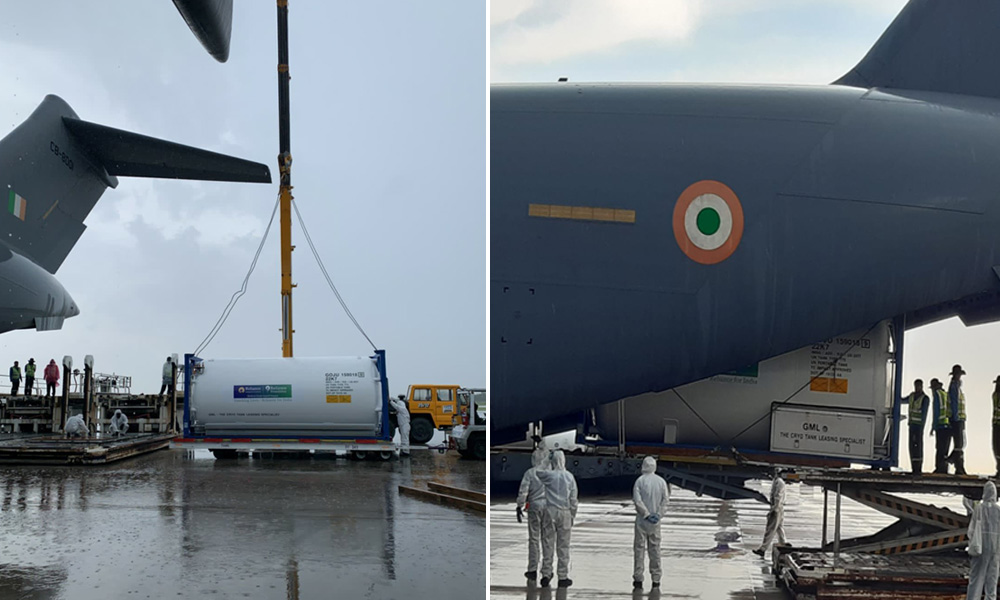
Image Credit: Twitter
Major Policy Shift: India Accepts Foreign Aid For First Time In 16 Years Amid Rising COVID-19 Cases
Writer: Kathakali Dutta
Kathakali Dutta is a second semester student of the Master of Communication and Journalism (Integrated) programme at the School of Mass Communication, KIIT Deemed University, Bhubaneswar.
Others/World, 5 May 2021 1:29 PM GMT
Editor : Shubhendu Deshmukh |
Shubhendu, the quint essential news junky, the man who loves science and politics in equal measure and offers the complete contrast to it by being a fan of urdu poetry as well.
Creatives : Abhishek M
" An engineer by profession, Abhishek is the creative producer of the team, graphic designing is his passion and travelling his get away. In more ways than one, he makes the content visually appealing."
More than 20 nations, ranging from neighbours to major powers, have offered assistance to India so far.
As a result of a massive shortage of oxygen and medicines, India has begun accepting assistance from foreign countries, marking a significant shift in its policy in 16 years. This shift has been signalled by two additional shifts in India's approach in dealing COVID crisis.
India now has "no conceptual issue" obtaining oxygen-related equipment and life-saving medicines from China, and New Delhi has yet to decide whether or not to accept assistance from Pakistan. However, it is unlikely to do so. Furthermore, state governments are free to obtain these life-saving devices and medicines from international agencies without interference from the federal government.
All three of these factors add to a significant shift in New Delhi's strategy, which has previously focused on self-reliance and the country's emerging-power picture. It's a significant shift from the previous 16 years when the UPA government, under the leadership of Dr Manmohan Singh, decided not to consider foreign assistance.
Uttarkashi earthquake(1991), Latur earthquake(1993), Gujarat earthquake(2001), Bengal cyclone(2002), and Bihar floods were all disasters for which India accepted foreign assistance (July 2004).
But after the December 2004 tsunami, the policy changed, and India stopped asking for foreign help. Prime Minister Dr Manmohan Singh statement, "We feel that we can cope up with the situation on our own and we will take their help if needed," soon became famous.
Due to this policy, India refused foreign aid after the Uttarakhand floods in 2013, the Kashmir earthquake in 2005, and the Kashmir floods in 2014 in the past 16 years.
Most recently, in August 2018, when UAE had offered ₹700 crore relief in the aftermath of the Kerala floods, the Centre ruled out any foreign assistance and said that it would meet the state's needs for relief and reconstruction through "domestic efforts".
More than 20 nations, ranging from neighbours to major powers, have offered assistance to India so far. Though Bhutan will provide oxygen, AstraZeneca vaccines are likely to be shared next month.
Last year, India announced that it would welcome donations to the newly formed PM-CARES fund from people from all over the world, "irrespective of nationalities."
However, New Delhi, on the other hand, refuses to acknowledge the shift in strategy, insisting that these are not donations or aid. They claim that India has made no "appeal" for assistance and that these are procurement decisions. If some governments or private entities wish to make a donation as a gift, they gratefully accept it, reported The Indian Express.
According to the report, the gifts received by India from foreign countries as a return of favour for the medical supplies, including hydroxychloroquine, vaccines, etc., that India had sent them earlier. More than 80 countries received 6.5 crore vaccines from India.
Sun Weidong, the Chinese Ambassador to India, announced that India would receive 25,000 oxygen concentrators. "Medical suppliers in China are working overtime to fulfil orders from India. In the last few days, at least 25,000 orders for oxygen concentrators have been placed. Health supplies will be transported by cargo aircraft. Related processes will be facilitated by Chinese customs," Weidong tweeted.
Also Read: India Declines UN's Offer Of Assistance Of Integrated Supply Chain Of COVID Related Material
 All section
All section














